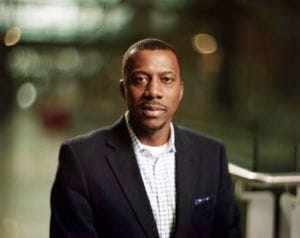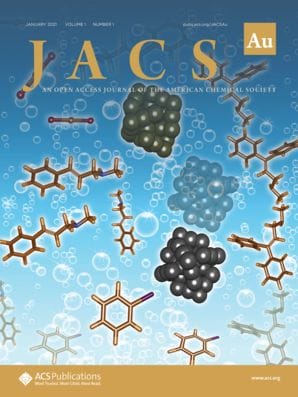February is Black History Month in the United States. This year, ACS Axial is looking forward and highlighting noteworthy African American chemists working today, engaging them in conversation about their life and work. Professor Rodney D. Priestley is the Vice Dean for Innovation and Pomeroy and Betty Perry Smith Professor of Chemical and Biological Engineering […]


Describe the current focus of your work.
My group’s work involves describing and developing complex materials, especially nanoparticles, thin polymer films, and nanocomposites, focusing on material properties at small length scales. The group develops methods to investigate the behavior of confined polymers to uncover new insights critical to understanding and predicting properties. For example, recent experiments have isolated and identified the precise role of factors—such as concentration, chemical connectivity, and interfaces—on glass formation at the nanoscale. My group also aims to create disruptive technologies that exploit the unique features of polymeric nanomaterials, ranging from designing structured colloids to creating nanostructured polymer films resistant to properties changes upon heating. Recent group interests also include polymers in sustainability and their implications on the environment, including colloids and hydrogels for water remediation.
How did you become interested in your field? What chemist has inspired you most?
Like many students, I owe a great deal of my career choice to two influential high school teachers, including my high school chemistry teacher. My interest in polymers emerged as an undergraduate student majoring in chemical engineering. My passion for research in the field solidified after completing a one-year undergraduate research project as a Ronald E. McNair Scholar, a program named in honor of a true pioneering African American scientist and someone who paved the way for folks like me. Of course, several individuals played a critical role in nurturing my interest in chemistry and polymer science—to them, I continue to say thank you. Finally, I have been inspired by all those who have taught, mentored, challenged, and supported me.
What does becoming a JACS Au Associate Editor mean to you? What are your hopes for the journal?
I think we all strive to be of service to our profession and colleagues in different ways. One of the most important ways to do so is to serve as a journal editor. It is, in fact, an honor to do so, and one in which I am humbled to participate. I view my role as an Associate Editor to be a steward of the chemical sciences’ scholarly research community. The launch of JACS Au, an open-access journal, represents the start of something new from the American Chemical Society in response to the community that it serves. Personally, it is exciting to be part of a new endeavor and to have an opportunity to help shape its success. JACS Au is a highly selective journal seeking to cover the full breadth of the ACS Publications portfolio. We hope that JACS Au makes its mark by building on the following three core elements: speed, rigor, and impact.
STEM continues to be an underrepresented field for African Americans, what changes need to take place in the chemistry field to change this?
As a discipline, chemistry is rightfully taking steps to recognize that it is not immune to the pervasive inequities in American society. Convergent research, as noted by the National Science Foundation, is the deep integration of various disciplines to solve vexing research problems focusing on societal needs. Within the convergent paradigm, it is critically important to consider participants’ diversity as a central ingredient for success. Indeed, increasing the successful participation of African Americans in the chemical sciences will help usher in innovations and creativity. Several published articles lay out concrete recommendations for the academy, funding agencies, and the scientific community as a whole to support Black scientists. To act on these recommendations, we need people who have the courage to do what is right to help create equality in the chemical sciences. I am reminded of a quote from the great tennis star and humanitarian, Arthur Ashe “Start where you are. Use what you have. Do what you can,” that I heard from a colleague of mine that lives by these words in support of increasing the number of Black researchers. Organizations such as the American Chemical Society, academic institutions such as mine, and scientists such as myself ultimately will be judged by our actions.
How do you think social media has played an important role in bringing awareness to African American chemists across the globe?
I am, personally, not active on social media. However, I know that it has allowed many African American chemists and chemical engineers to share information about their research and accomplishments in ways not previously possible. It has also allowed them to raise awareness about biases and challenges faced by members of our community as we strive to push the boundaries in chemical sciences.
What’s one piece of advice you wished you’d received before starting your career in chemistry?
I believe it is important for anyone in the earlier stages of their career to realize that not everyone they encounter has their best interest in mind. Unfortunately, this might be particularly true for Black scientists.
Where do you hope to see the field, as it pertains to African Americans in the next 10 years?
I hope to see the entire field of chemistry, e.g., ACS, The American Institute of Chemical Engineers, The National Organization for the Professional Advancement of Black Chemists and Chemical Engineers, etc., come together to develop a national agenda and program to help overcome and eliminate racial barriers that African Americans encounter as they pursue careers in the chemical sciences. By working together, the community can develop shared goals and commitments, and build on the strengths of various entities, including societies, academic departments, and funding agencies.
Chemistry plays an important role in addressing many societal challenges. To ensure that future challenges are met, we need the involvement of all of society. It is, therefore, important that we strive for African American participation and success in the entire research, innovation, and entrepreneurship spectrum in the field of chemistry.
